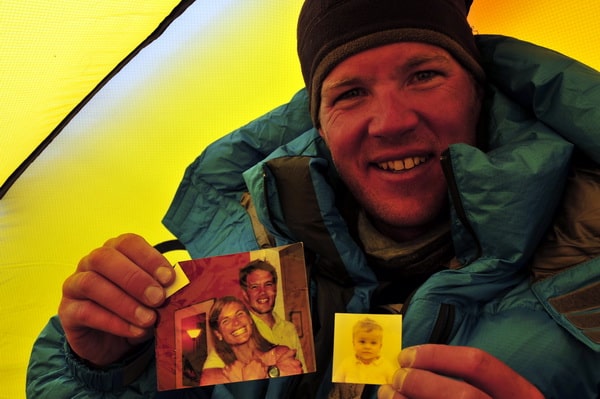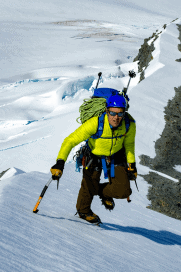There’s nothing easy about climbing mountains. They’re big, cold, and dangerous. You get sick, you get tired, your head hurts and your muscles ache and your lungs burn. And, on Everest, all of that is magnified in therarefied air most often occupied by jets.
But, to me, these are not the hardest parts of climbing big mountains…
NOTE: This is a blog entry I wrote during this spring's First Ascent "Return to Everest" expedition. It never ran on the blog though, so I thought I'd post it here as it speaks from the heart – or at least from my heart – as to the most challenging aspect of big Himalayan expeditions.
The Hardest Part
There's nothing easy about climbing mountains. They're big, cold, and dangerous. You get sick, you get tired, your head hurts and your muscles ache and your lungs burn. And, on Everest, all of that is magnified in the rarefied air most often occupied by jets.
But, to me, these are not the hardest parts of climbing big mountains:
- Everest is big…sure. That's kind of the point, I guess. If it weren't, well, there probably wouldn't be a city of some 800 people at it's base every spring.
- Everest is cold. It sure is. But, we've got the best gear in the industry, designed by those of us who live and breathe the cold for our livelihoods. That, we can endure.
- Everest is dangerous. Indeed, it is. But, so is life. If we avoid danger at all times in life, we run the risk, as George Mallory once wrote, of drying up like a pea in its shell. Or, to quote Helen Keller: Life is either a daring adventure, nothing at all. In the mountains, we accept the inherent risk, do our best to minimize it, and continue onward.
- On Everest, you get sick, you get tired, your head hurts and your muscles ache and your lungs burn. All true.. But, I get sick at home, too. I get tired when I ride my bike through the Rockies, and I get headaches and muscle aches and my lungs burn whenever I push my body. All these things are real, but transitory. They're an uncomfortably, but inherent, part of the enterprise, and nothing I personally can't get used to in moderation.
So, if altitude, cold, danger, and bodily abuse is not the hard part, then what is? For me, it's simple: when I roll over in my tent and look at the western wall, I see gazing back at me the sweet, innocent eyes of my daughter, Lila, 21 months old. Next to her picture is one of my wife, Wende, supportive to the end of my adventures and life and career.

Gazing into their eyes, my heart aches. I yearn to be home, listening to my daughter practicing her first few words, helping her as she explores our world, sitting on the front porch with my family listening to the birds chirp about the onset of spring in Colorado. Looking at their pictures, the reality of where I am and how long I am gone comes rushing to me like a freight train, the longing to be home again approaching overwhelm.
The internal monologue then begins on cue. Why do you do this? Why didn't you choose a “real” job, one with “real” hours in a “real” location? You should've stayed in real estate in Colorado Springs…enough of this expedition stuff. Enough. Go home.
This, indeed, is the hardest part. But, also the easiest. Easy, because, in my heart of hearts, I know the mountains are as much a part of me – of my life, my personality, my very being – as anything, and to ignore that fundamental element of myself would be to ignore the need to breathe or eat or sleep. No, the mountains are where I thrive, they are the fuel for my soul, and the environment which humbles, grounds, and continually inspires me.
So, tomorrow, as I once again ascend through the Khumbu Icefall, I'll have my pictures of Wende and Lila in my breast pocket, close to my heart. I'll feel them through the miles, and think about them every step. I'll minimize the risk, climb safe and steady, be both inspired and humbled each moment along the way. I will, as my wife and I always urge each other, live each day as if it were my last, and take inspiration from that perspective. And, I'll know that, even though I miss Wende and Lila terribly and they are missing me, we all understand.


Great write up Jake!
http://www.everest1953.co.uk
Nice Jake. Well said.
Beautiful sentiments Jake.
So well said Jake…
Being able to live among both worlds is a real challenge at times…
You are so very lucky to have a partner who shares in your dreams.
DSD
Thanks, DSD (and everyone else). I am very lucky – I sometimes don’t know how Wende puts up with my exploits, but I count my blessings!
Each climber has a different opinion about what is the most difficult part of climbing Everest. Most would agree, though, that the altitude is tough to deal with. And most will also have stories about crossing the infamous Khumbu Icefall going from Base Camp to Camp One. Mountaineers climb through this moving sea of ice using ordinary aluminum garden ladders.